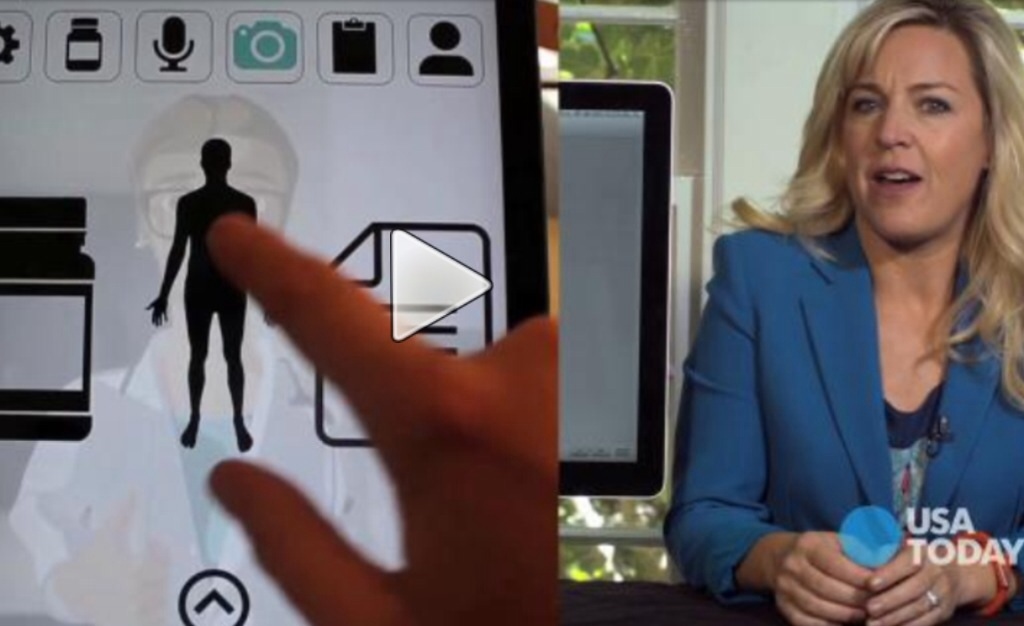Why a « Switzerland Approach » Might Become a Key Part of Wearable Health Platforms
30/06/2014Le CNOM et Vidal publient le deuxième baromètre sur les médecins utilisateurs de smartphone en France | esante.gouv.fr, le portail de l’ASIP Santé
30/06/2014Talk to a virtual doctor on your iPad
Imagine for a moment that your allergies have been troubling you for the past few days. What do you do? Complain on Facebook? Probably. Make an appointment with your doctor? Maybe. Talk to a virtual doctor on your iPad? Never. Well, soon you will.
A company called Geppetto Avatars is about to turn health care on its head with virtual physician’s assistants that very well could be smarter than any doctor who ever walked the Earth. In one of the company’s allergy applications, a sympathetic young doctor named Sophie talks you through air quality and the pollen index in your neighborhood. Then, she makes sure that you’re taking your prescriptions right. When you tell her you’re feeling really bad, she gives a gentle « mmm-hmmm, » to let you know she’s been there and wants nothing more than to help you feel better.
Except she hasn’t been there. Because she’s a computer program.
If you saw the move Her, it’s a lot like that. Only better, because this virtual chick won’t break your heart. If anything, she’ll try to fix it.
FUTURE OF MEDICAL WORK: The computer will see you now
The thought of using computers to help keep us healthy isn’t new or even all that novel: Let’s face it, when it comes to raw data, computers are smarter than us. They might not be able to take over the world, Terminator-style, but IBM’s Watson shamed its human competition on Jeopardy, and that’s pretty close.
The wealth of wisdom housed on connected hard drives around the globe is simply more than a human brain can handle. When you go to the doctor, you have access to a fraction of that knowledge, and while health care professionals know a heck of a lot more than the average person, it seems safe to say that more is better when it comes to your well-being.
But computer programs have always lacked the ability to read body language, non-verbal cues, and all those parts of communication that make us human. Just asking Siri for directions to the nearest pizza place is a far cry from getting advice from a virtual robot on something as serious as your health. At best, we’re often left hoping for a response that borders on intelligent — as the computer crunches key words and text strings — trying to mix and match words versus meaning.
Geppetto Avatars tackles the human component. Just as your real doctor learns from the tone of your voice and your facial expressions, so does Sophie. The system uses your device’s camera and microphone to see and hear what you say, then uses natural language processing, sentiment analysis and voice-to-text recognition to analyze the meaning behind your words. If you sound down in the dumps about a health issue, you’ll get a sympathetic response from your virtual practitioner, and if you’re super happy about a new exercise plan, the digital doc will share your excitement.
As with most AI applications, the more you use it, the better job it does at reading you — picking up whether your voice is hoarse or your breathing labored, or whether you sound worried or anxious. The hope is that with some training, it will be able to detect your mood, read your state of mind, and respond accordingly with one of its tens of thousands of recorded answers. It will also share your information with your real, living health care professionals.
Geppetto’s founders say the idea here is not to replace your doctor, but to provide tools for both patient and practitioner to get the information they need. In addition to applications for allergies, Geppetto’s working on versions of Sophie to work with kids with asthma, people with diabetes and arthritis, and developing a product targeting Parkinson’s disease.
If this all seems really far-fetched, consider this: Geppetto creators say their Avatars will be talking with people within three to five months. The founders also told us that they’re in a daily patent race with Apple, Google, Microsoft and a handful of other massive tech companies working on similar applications to move ahead with a more realistic relationship between computers and man. So … this is likely just the tip of the communicating, mood-reading, mind-interpreting Avatar iceberg.
Jennifer Jolly is an Emmy Award-winning consumer tech contributor and host of USA TODAY’s digital video show TECH NOW. E-mail her at techcomments@usatoday.com. Follow her on Twitter: @JenniferJolly.
Source: www.usatoday.com



